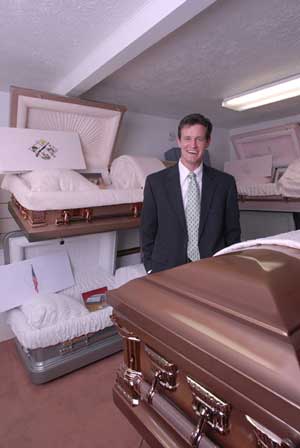Funeral Director/Embalmer
Tasks & duties

Funeral directors/embalmers may do some or all of the following:
-
arrange for the removal of bodies from private homes, hospitals and sometimes from accident scenes
-
give advice on funeral arrangements
-
preserve, prepare and keep bodies for viewing before burial or cremation
-
arrange and direct funerals, which may include booking the cemetery or crematorium, arranging death notices in newspapers, printing order of service sheets, organising audiovisual presentations, and arranging music and flowers
-
organise the after-service reception, including the catering
-
confirm the issue and verification of a medical certificate or obtain a Coroner's Certificate
-
register the death and obtain a death certificate
-
attend the funeral service and look after the family
-
transport the casket from the service to the burial or cremation
-
clean vehicles
-
help with legal details, such as Work and Income (WINZ) and Accident Compensation Corporation (ACC) claims
-
make arrangements, such as booking the airline, to send deceased people overseas from New Zealand
Specialisations
Funeral directors/embalmers may specialise in either funeral directing or embalming, however most are trained and qualified in both areas.
Skills & knowledge
Funeral directors/embalmers need to have:
-
knowledge of legal issues relating to death
-
knowledge of health issues relating to handling deceased people
-
knowledge of human anatomy
-
knowledge of embalming and how to prepare a body for burial
-
knowledge of various religious ceremonies, and differences in cultural and religious beliefs about the human body
-
knowledge of human behaviour, and the ability to relate to people and put them at ease
-
budgeting and business management skills
-
knowledge of desktop publishing
-
good communication skills
Entry requirements
There are no specific requirements for becoming a funeral director/embalmer.
However, to be accepted into funeral directing and embalming courses, applicants must:
-
be at least 20 years old
-
have at least one year's experience working in a funeral home
-
be currently employed in the industry
-
be sponsored by their employer to complete the qualifications
Secondary education
School Certificate or NCEA equivalent is recommended to gain work as a funeral director/embalmer. Useful subjects include English and science.
Tertiary education
Tertiary courses in science or behavioural sciences, such as psychology, may be useful for funeral directors/embalmers.
Training on the job
Most skills are gained on the job. Funeral directors/embalmers may also attend seminars and workshops to keep up to date with new developments in the industry.
Useful experience
Experience dealing with the public, such as in the hospitality industry, is useful for funeral directors. Counselling, nursing and rest home work provide good experience for dealing with grieving people. Work in make-up or cosmetics, and/or work in a hospital or laboratory is useful for embalmers.
For more information, please refer to Career Services.
Document Actions
